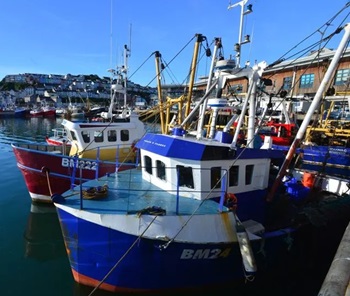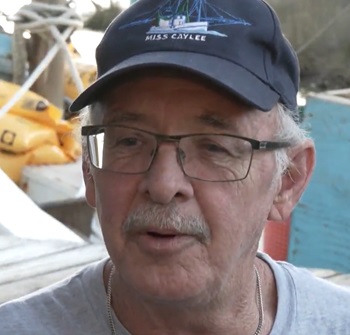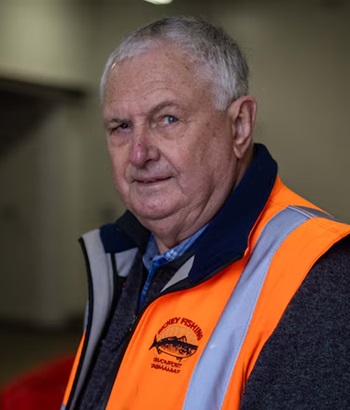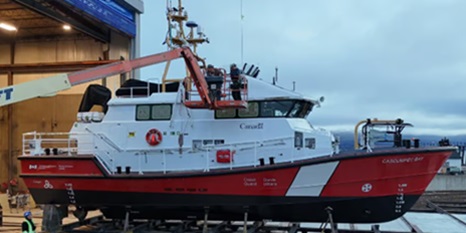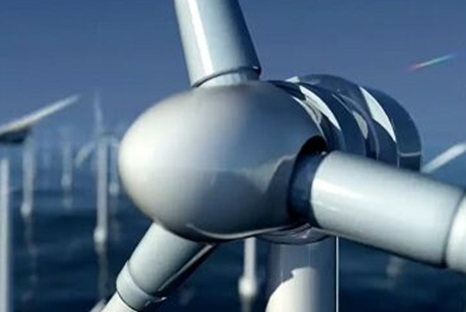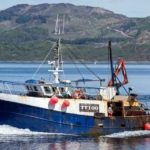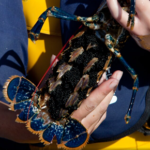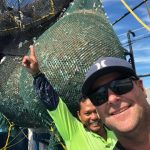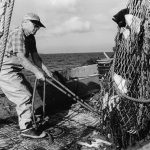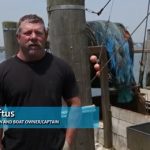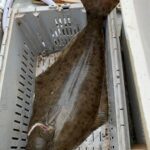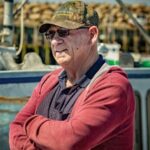Category Archives: International
‘A lot of anxiety’: N.L. seafood industry will see big hit if Trump follows through with tariffs
 President-elect Donald Trump’s 25 per cent tariff threat is worrying people in Newfoundland and Labrador’s seafood industry. More than 60 per cent of the province’s seafood is sold in the United States. “There’s certainly a lot of anxiety right now in the seafood industry, and I’m no exception,” said Labrador Gem Seafoods’ president Danny Dumaresque in an interview with The Telegram on Wednesday, Nov. 27. Trump said in a social media post Monday night that on his first day in office, he would impose the tariffs until Canada and Mexico stop illegal border crossings and prevent drugs such as fentanyl from entering the U.S. “Both Mexico and Canada have the absolute right and power to easily solve this long simmering problem. We hereby demand that they use this power, and until such time that they do, it is time for them to pay a very big price!” Trump wrote on his social media platform Truth Social. more, >>CLICK TO READ<< 07:57
President-elect Donald Trump’s 25 per cent tariff threat is worrying people in Newfoundland and Labrador’s seafood industry. More than 60 per cent of the province’s seafood is sold in the United States. “There’s certainly a lot of anxiety right now in the seafood industry, and I’m no exception,” said Labrador Gem Seafoods’ president Danny Dumaresque in an interview with The Telegram on Wednesday, Nov. 27. Trump said in a social media post Monday night that on his first day in office, he would impose the tariffs until Canada and Mexico stop illegal border crossings and prevent drugs such as fentanyl from entering the U.S. “Both Mexico and Canada have the absolute right and power to easily solve this long simmering problem. We hereby demand that they use this power, and until such time that they do, it is time for them to pay a very big price!” Trump wrote on his social media platform Truth Social. more, >>CLICK TO READ<< 07:57
South Carolina shrimpers applaud decision to impose duties on shrimp imported from four countries
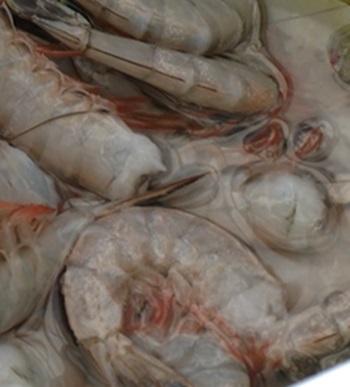 South Carolina shrimpers are celebrating the U.S. International Trade Commission’s recent decision to crack down on frozen shrimp imports from four countries. The ITC voted in favor of issuing countervailing duties on frozen, warm-water shrimp imports from Ecuador, India, and Vietnam after the U.S. Department of Commerce determined those governments were illegally subsidizing the industry. “We’re grateful because it’s an acknowledgment of what we feel and we experience in the industry and we see on a daily basis,” said Bryan Jones, a first-generation shrimper who lives in McClellanville. Jones serves as vice president of the South Carolina Shrimpers Association and was among a group of commercial fishermen who testified before the ITC in Washington, D.C. in October. more, >>CLICK TO READ<< 14:20
South Carolina shrimpers are celebrating the U.S. International Trade Commission’s recent decision to crack down on frozen shrimp imports from four countries. The ITC voted in favor of issuing countervailing duties on frozen, warm-water shrimp imports from Ecuador, India, and Vietnam after the U.S. Department of Commerce determined those governments were illegally subsidizing the industry. “We’re grateful because it’s an acknowledgment of what we feel and we experience in the industry and we see on a daily basis,” said Bryan Jones, a first-generation shrimper who lives in McClellanville. Jones serves as vice president of the South Carolina Shrimpers Association and was among a group of commercial fishermen who testified before the ITC in Washington, D.C. in October. more, >>CLICK TO READ<< 14:20
Dumping day begins in southwestern Nova Scotia with calm conditions
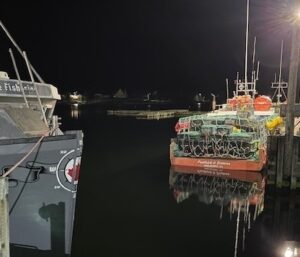 Dumping day began with much fanfare in southwestern Nova Scotia early Tuesday morning. Fireworks signaled the start of the commercial lobster season in Sambro, with loved ones waving goodbye from the wharf where crowds gathered to see the fishers off. “It’s an exciting morning, we always all come down and watch the fireworks, as they go out, it’s a pretty big day for everybody,” said Briana Beaver, whose partner is a fisher. Dumping day for lobster fishing areas 33 and 34 is typically the final Monday of November, but there was a one-day delay this year due to rough weather. While conditions were calm Tuesday, boats that work in LFA 34, which extends from Shelburne County around the southwest coast of the province, were allowed to leave a bit earlier at 5 a.m. Photos, Video, more, >>CLICK TO READ<< 10:30
Dumping day began with much fanfare in southwestern Nova Scotia early Tuesday morning. Fireworks signaled the start of the commercial lobster season in Sambro, with loved ones waving goodbye from the wharf where crowds gathered to see the fishers off. “It’s an exciting morning, we always all come down and watch the fireworks, as they go out, it’s a pretty big day for everybody,” said Briana Beaver, whose partner is a fisher. Dumping day for lobster fishing areas 33 and 34 is typically the final Monday of November, but there was a one-day delay this year due to rough weather. While conditions were calm Tuesday, boats that work in LFA 34, which extends from Shelburne County around the southwest coast of the province, were allowed to leave a bit earlier at 5 a.m. Photos, Video, more, >>CLICK TO READ<< 10:30
New England labor unions call for faster offshore wind buildout
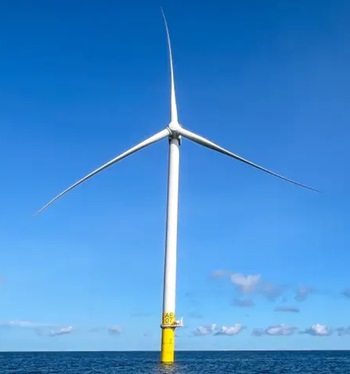 “We looked at the way this industry was starting to develop and thought to ourselves: How can we work as a labor movement to make sure we’re making this an industry that is not only going to benefit the climate but benefit our members?” (read the report) said Patrick Crowley, president of the Rhode Island chapter of the American Federation of Labor and Congress of Industrial Organizations (AFL-CIO), which represents roughly 900,000 union members across the three states. Crowley and the AFL-CIO partnered with the Climate Jobs National Resource Center and unions in Massachusetts and Connecticut to put together the new report, which outlines how the industry can expand with organized labor at the forefront. To begin with, the union report suggests that the states aim higher for their offshore wind goals in order to boost the region’s economy and take full advantage of their unique access to wind. more, >>CLICK TO READ<< 09:25
“We looked at the way this industry was starting to develop and thought to ourselves: How can we work as a labor movement to make sure we’re making this an industry that is not only going to benefit the climate but benefit our members?” (read the report) said Patrick Crowley, president of the Rhode Island chapter of the American Federation of Labor and Congress of Industrial Organizations (AFL-CIO), which represents roughly 900,000 union members across the three states. Crowley and the AFL-CIO partnered with the Climate Jobs National Resource Center and unions in Massachusetts and Connecticut to put together the new report, which outlines how the industry can expand with organized labor at the forefront. To begin with, the union report suggests that the states aim higher for their offshore wind goals in order to boost the region’s economy and take full advantage of their unique access to wind. more, >>CLICK TO READ<< 09:25
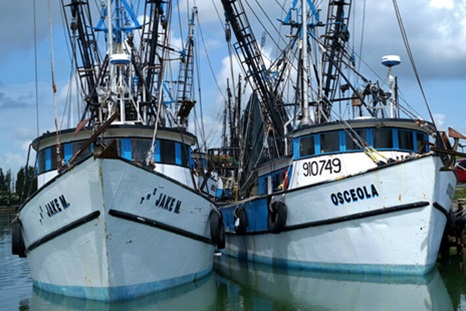
Struggling Valley shrimpers receive good news on new import measures
In an industry where bad news is the norm, shrimpers in Texas and elsewhere in the United States finally have a sliver of good news. The U.S. International Trade Commission, or ITC, on Tuesday determined that the U.S. shrimp industry is being “materially injured” by imports of frozen warm-water shrimp from Indonesia that the U.S. Department of Commerce says are being sold in this country at less than fair value, and also by shrimp imports from Ecuador, India and Vietnam that the Commerce Department says are being subsidized by the governments of those countries. As a result of the ITC’s determinations, the Commerce Department will issue “countervailing duty orders on imports of this product from Ecuador, India and Vietnam and an anti-dumping duty order on imports of this product from Indonesia,” the ITC announced Tuesday. more, >>CLICK TO READ<< 11:57
Exploring the impact of offshore wind on whale deaths
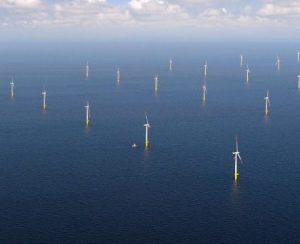 In the winter of 2022–2023, nearly a dozen whales died off the coast of New Jersey, near the sites of several proposed wind farms. Their deaths prompted concern that related survey work being conducted in the area somehow contributed to their deaths. The increased presence of these turbines in coastal waters, along with the noise from construction and surveys, has led to concerns of their impact on marine life. In particular, cetaceans such as whales and dolphins are likely to be sensitive to the noises and increased marine traffic brought by these turbines. However, the Marine Mammal Commission, a federal oversight agency, states there is no evidence linking the whales that died in the New Jersey region in the winter of 2022–2023 to wind energy development. more, >>CLICK TO READ<< 10:35
In the winter of 2022–2023, nearly a dozen whales died off the coast of New Jersey, near the sites of several proposed wind farms. Their deaths prompted concern that related survey work being conducted in the area somehow contributed to their deaths. The increased presence of these turbines in coastal waters, along with the noise from construction and surveys, has led to concerns of their impact on marine life. In particular, cetaceans such as whales and dolphins are likely to be sensitive to the noises and increased marine traffic brought by these turbines. However, the Marine Mammal Commission, a federal oversight agency, states there is no evidence linking the whales that died in the New Jersey region in the winter of 2022–2023 to wind energy development. more, >>CLICK TO READ<< 10:35
Two Dominican nationals sentenced for smuggling endangered juvenile eels from Puerto Rico
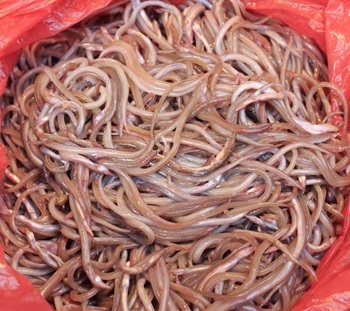 On Nov. 14, U.S. District Court Judge Aida M. Delgado-Colón sentenced Simón De la Cruz Paredes, 56, to 24 months in prison and two years of supervised release. On Thursday, Saúl Enrique José De la Cruz, 39, received the same sentence in the U.S. District Court for the District of Puerto Rico. Court documents revealed the pair spent months harvesting the juvenile eels in rivers near Levittown, Puerto Rico. The eels were kept alive using specialized oxygenation equipment while the defendants prepared a boat for the trip back to the Dominican Republic. On Feb. 21, they departed Puerto Rico with 30 kilograms of glass eels valued at $132,000, a handgun, and hundreds of rounds of ammunition. The U.S. Coast Guard intercepted the vessel about 40 miles from Puerto Rico after the men refused to comply with an order to stop. more, >>CLICK TO READ<< 09:27
On Nov. 14, U.S. District Court Judge Aida M. Delgado-Colón sentenced Simón De la Cruz Paredes, 56, to 24 months in prison and two years of supervised release. On Thursday, Saúl Enrique José De la Cruz, 39, received the same sentence in the U.S. District Court for the District of Puerto Rico. Court documents revealed the pair spent months harvesting the juvenile eels in rivers near Levittown, Puerto Rico. The eels were kept alive using specialized oxygenation equipment while the defendants prepared a boat for the trip back to the Dominican Republic. On Feb. 21, they departed Puerto Rico with 30 kilograms of glass eels valued at $132,000, a handgun, and hundreds of rounds of ammunition. The U.S. Coast Guard intercepted the vessel about 40 miles from Puerto Rico after the men refused to comply with an order to stop. more, >>CLICK TO READ<< 09:27
After a dramatic decline, lake trout have recovered in most of Lake Superior
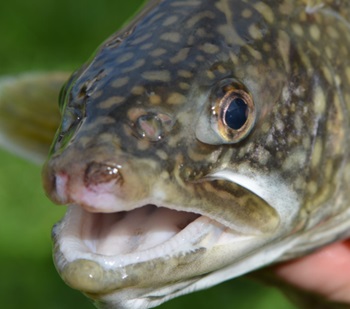 After decades of work, fishery managers say lake trout have fully recovered in most of Lake Superior after the invasive, fish-killing sea lamprey decimated their numbers. The Lake Superior Committee of the Great Lakes Fishery Commission, which is made up of state, tribal and Canadian natural resource managers, announced the population’s recovery Wednesday. The lake trout population in Lake Superior dropped to dramatically low levels during the mid-1900s due to overfishing and an invasion of sea lampreys, eel-like parasites that suck the blood of their hosts. The parasitic fish spread to the Great Lakes from the Atlantic Ocean, invading Lake Superior by 1938. more, >>CLICK TO READ<< 11:03
After decades of work, fishery managers say lake trout have fully recovered in most of Lake Superior after the invasive, fish-killing sea lamprey decimated their numbers. The Lake Superior Committee of the Great Lakes Fishery Commission, which is made up of state, tribal and Canadian natural resource managers, announced the population’s recovery Wednesday. The lake trout population in Lake Superior dropped to dramatically low levels during the mid-1900s due to overfishing and an invasion of sea lampreys, eel-like parasites that suck the blood of their hosts. The parasitic fish spread to the Great Lakes from the Atlantic Ocean, invading Lake Superior by 1938. more, >>CLICK TO READ<< 11:03
U.S. International Trade Commission votes in favor of antidumping, countervailing duties on shrimp imports
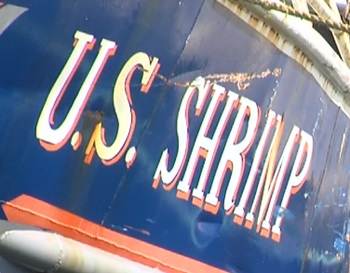 Southeast Texas fishermen are celebrating a win after the U.S. International Trade Commission voted in favor of antidumping and countervailing duties on shrimp imports from four countries. On Wednesday morning, the U.S. International Trade Commission voted in favor of antidumping and countervailing duty petitions filed by the American Shrimp Processors Association against imports of frozen warm-water shrimp from Ecuador, India, Indonesia, and Vietnam. As a result of the commission’s vote, duties ranging from 2.84% to 221.82% will be imposed on imports of shrimp from the four countries. “We are thrilled with the outcome of today’s vote,” said Trey Pearson, president of ASPA. more, >>CLICK TO READ<< 13:19
Southeast Texas fishermen are celebrating a win after the U.S. International Trade Commission voted in favor of antidumping and countervailing duties on shrimp imports from four countries. On Wednesday morning, the U.S. International Trade Commission voted in favor of antidumping and countervailing duty petitions filed by the American Shrimp Processors Association against imports of frozen warm-water shrimp from Ecuador, India, Indonesia, and Vietnam. As a result of the commission’s vote, duties ranging from 2.84% to 221.82% will be imposed on imports of shrimp from the four countries. “We are thrilled with the outcome of today’s vote,” said Trey Pearson, president of ASPA. more, >>CLICK TO READ<< 13:19
Commercial lobster fishers want total catch cut to help save WA fishery
 Commercial fishers in Western Australia’s $285 million lobster industry say warning bells are ringing for the sector’s future sustainability, despite reassurances from state government scientists that stocks are at healthy levels. The commercial lobster industry is concerned due to the number of baby lobster, known as puerulus, being found along the coast, along with falling catch rates and revised economic modelling. As a result, the industry has requested its total catch be dropped next season from the current limit of 7,300 tonnes to 6,800 tonnes. Cervantes based fisher Michael Thompson supported the catch reduction and said it could have gone lower. “Our puerulus since 2007 till today is 50 per cent lower than what we used to receive back to the coast to our collectors,” he said. Photos, more, >>CLICK TO READ<< 10:02
Commercial fishers in Western Australia’s $285 million lobster industry say warning bells are ringing for the sector’s future sustainability, despite reassurances from state government scientists that stocks are at healthy levels. The commercial lobster industry is concerned due to the number of baby lobster, known as puerulus, being found along the coast, along with falling catch rates and revised economic modelling. As a result, the industry has requested its total catch be dropped next season from the current limit of 7,300 tonnes to 6,800 tonnes. Cervantes based fisher Michael Thompson supported the catch reduction and said it could have gone lower. “Our puerulus since 2007 till today is 50 per cent lower than what we used to receive back to the coast to our collectors,” he said. Photos, more, >>CLICK TO READ<< 10:02
‘Dumping Day’ for southwest N.S. lobster season fast approaching
 Lobster fishers in southwestern Nova Scotia are ‘gearing’ up their boats. Dumping Day for fishing areas 33 and 34, which stretches from Digby around to Halifax is scheduled for Monday. Dan Fleck with the Brazil Rock 33/34 Lobster Association says weather calls with port reps and DFO begin this Friday. “Any winds greater than 26 knots in any direction within the area, DFO will implement a closure for the day. It’s also possible port reps can open or close it, depending on what is safest for all, as safety is most important,” said Fleck. more, >>CLICK TO READ<< 09:04
Lobster fishers in southwestern Nova Scotia are ‘gearing’ up their boats. Dumping Day for fishing areas 33 and 34, which stretches from Digby around to Halifax is scheduled for Monday. Dan Fleck with the Brazil Rock 33/34 Lobster Association says weather calls with port reps and DFO begin this Friday. “Any winds greater than 26 knots in any direction within the area, DFO will implement a closure for the day. It’s also possible port reps can open or close it, depending on what is safest for all, as safety is most important,” said Fleck. more, >>CLICK TO READ<< 09:04
Bam! Scientists study wind farm construction noise impacts on lobsters… by making big noises
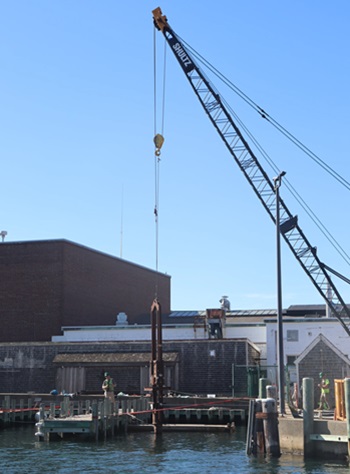 Thirteen feet below the surface of Woods Hole harbor, a lobster shelters under a plastic shield in a wire cage. An experiment is happening: every seven seconds on the dock above, a pile driver pounds a long, steel post deeper into the muddy harbor bottom nearby. The experiment happening here at this dock is designed to replicate, at small scale, the pile driving necessary to construct an offshore wind farm. The goal is to understand how a variety of marine creatures, not only lobsters, but other fish-market-friendly species like scallops, flounder, black sea bass, and squid respond to the noisy, intensive work of building an offshore wind farm. It’s something fishers and regulators are especially interested in. Already, the WHOI team’s earlier studies have shown that squid, which detect sound through vibration, responded dramatically to pile-driving noise — at least, at first. But it’s a different story for scallops, one of the highest value fisheries in the U.S. As soon as scallops were exposed to pile driving noise, they clammed up. Photos, more, >>CLICK TO READ<< 07:59
Thirteen feet below the surface of Woods Hole harbor, a lobster shelters under a plastic shield in a wire cage. An experiment is happening: every seven seconds on the dock above, a pile driver pounds a long, steel post deeper into the muddy harbor bottom nearby. The experiment happening here at this dock is designed to replicate, at small scale, the pile driving necessary to construct an offshore wind farm. The goal is to understand how a variety of marine creatures, not only lobsters, but other fish-market-friendly species like scallops, flounder, black sea bass, and squid respond to the noisy, intensive work of building an offshore wind farm. It’s something fishers and regulators are especially interested in. Already, the WHOI team’s earlier studies have shown that squid, which detect sound through vibration, responded dramatically to pile-driving noise — at least, at first. But it’s a different story for scallops, one of the highest value fisheries in the U.S. As soon as scallops were exposed to pile driving noise, they clammed up. Photos, more, >>CLICK TO READ<< 07:59
Suggested areas for offshore wind around N.S. swell in size
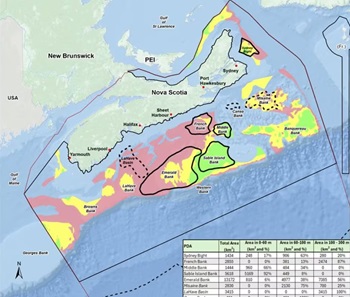 Offshore areas around Nova Scotia recommended for wind energy projects have ballooned in size in the latest version of a report for government, troubling some in the fishing industry who are bracing for disruptions. The draft final report comes from the regional assessment committee, which was tasked by the province and Ottawa two years ago to investigate the potential impacts of offshore wind development on Nova Scotia. It describes eight potential development areas that cover a total of 31,200 square kilometres. The areas stretch from the tip of George’s Bank southwest of Nova Scotia, up the Atlantic coastline and around Cape Breton Island. more, >>CLICK TO READ<< 08:14
Offshore areas around Nova Scotia recommended for wind energy projects have ballooned in size in the latest version of a report for government, troubling some in the fishing industry who are bracing for disruptions. The draft final report comes from the regional assessment committee, which was tasked by the province and Ottawa two years ago to investigate the potential impacts of offshore wind development on Nova Scotia. It describes eight potential development areas that cover a total of 31,200 square kilometres. The areas stretch from the tip of George’s Bank southwest of Nova Scotia, up the Atlantic coastline and around Cape Breton Island. more, >>CLICK TO READ<< 08:14
Court won’t overturn decision to cut quota from N.S., N.B. elver licence holders
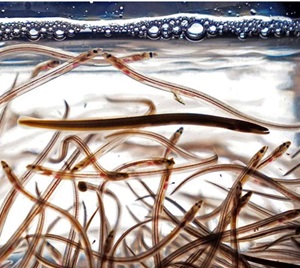 Three judges have delivered another blow to beleaguered commercial groups that fish for lucrative juvenile eels in the Maritimes, agreeing with a lower court ruling that upheld Ottawa’s 2022 decision to transfer a portion of their quota to First Nations without compensation. The Federal Court of Appeal heard arguments in the case last week in Halifax, and emerged with a decision that found the federal fisheries minister had “broad discretion” and had used it reasonably. Tien Nguyen, a pioneer in Canada’s fishery for young eels, also known as elvers, said he had hoped the judges would address the “absolute power” of the fisheries minister to make decisions that have enormous financial impact on licence holders. “It’s just like you build up the business, you struggle with it for a number of years, and when it’s finally successful, the government decided to take it away from you,” more, >>CLICK TO READ<< 15:40
Three judges have delivered another blow to beleaguered commercial groups that fish for lucrative juvenile eels in the Maritimes, agreeing with a lower court ruling that upheld Ottawa’s 2022 decision to transfer a portion of their quota to First Nations without compensation. The Federal Court of Appeal heard arguments in the case last week in Halifax, and emerged with a decision that found the federal fisheries minister had “broad discretion” and had used it reasonably. Tien Nguyen, a pioneer in Canada’s fishery for young eels, also known as elvers, said he had hoped the judges would address the “absolute power” of the fisheries minister to make decisions that have enormous financial impact on licence holders. “It’s just like you build up the business, you struggle with it for a number of years, and when it’s finally successful, the government decided to take it away from you,” more, >>CLICK TO READ<< 15:40
DFO Affirms Canada’s Control Over Northern Cod Management
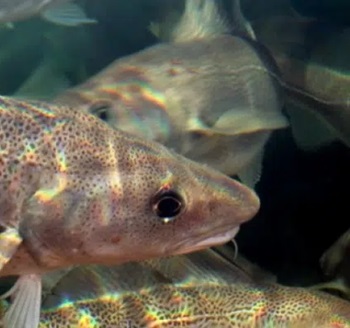 The Department of Fisheries and Oceans is weighing in following concerns raised about northern cod management by provincial fisheries minister Gerry Byrne. A recent EU news release suggested that North Atlantic Fishery Organization (NAFO) was making the management decisions when it came to northern cod, but DFO says there is no debate that Canada manages the stock. According to the federal department, Canada alone completes the scientific assessment of the stock and sets the annual total allowable catch. more, >>CLICK TO READ<< 07:31
The Department of Fisheries and Oceans is weighing in following concerns raised about northern cod management by provincial fisheries minister Gerry Byrne. A recent EU news release suggested that North Atlantic Fishery Organization (NAFO) was making the management decisions when it came to northern cod, but DFO says there is no debate that Canada manages the stock. According to the federal department, Canada alone completes the scientific assessment of the stock and sets the annual total allowable catch. more, >>CLICK TO READ<< 07:31
RNLI can brave the ‘fiercest’ weather with new boat
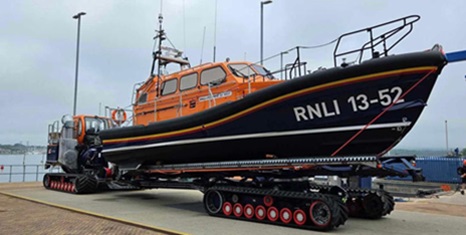 The arrival of a new lifeboat would allow crews to brave “the fiercest weather conditions”, the Royal National Lifeboat Institution (RNLI) said. It was due to be unveiled at Clacton-on-Sea, in Essex, on Saturday afternoon after being built in Dorset. The lifeboat charity said its lifesaving capabilities across the Tendring coastline were strengthened thanks to the new vessel. Offering space for six crew members, it was built to reach a top speed of 25 knots (28mph) and has a range of 250 nautical miles (287 miles). more, >>CLICK TO READ<< 18:43
The arrival of a new lifeboat would allow crews to brave “the fiercest weather conditions”, the Royal National Lifeboat Institution (RNLI) said. It was due to be unveiled at Clacton-on-Sea, in Essex, on Saturday afternoon after being built in Dorset. The lifeboat charity said its lifesaving capabilities across the Tendring coastline were strengthened thanks to the new vessel. Offering space for six crew members, it was built to reach a top speed of 25 knots (28mph) and has a range of 250 nautical miles (287 miles). more, >>CLICK TO READ<< 18:43
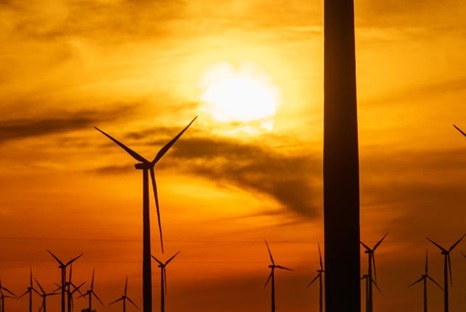
Donald Trump Pledges to Halt Big Wind Subsidies
Donald Trump’s election victory is quickly taking the wind out of the Biden administration’s ambitious renewables initiatives. President-elect Trump promised to end federal subsidies for offshore wind projects on his first day in office. As with many of his campaign pledges, Americans wait to see whether he will deliver. However, the market did not wait to see. Stock prices of offshore wind developers and turbine makers moved sharply downward following election day as investors query whether windmill projects are economically viable without the hefty federal subsidies Trump has promised to terminate. Environmental groups and fishermen have also raised concerns about the potential ecological trade-offs of this plastic-based technology and worries about ecotoxins created in the manufacturing of solar panels and EVs have caused consumers to pause. more, >>CLICK TO READ<< 10:22
Lack of fishing prohibitions in ‘grey zone’ could pose risk for right whales, expert says
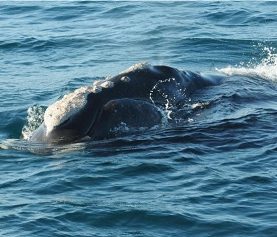 One marine conservation expert has questions about the efforts on the part of Fisheries and Oceans after North Atlantic right whales were detected in the Bay of Fundy in recent weeks, including in an area where both Canadian and American fishermen catch lobster. In October, Fisheries and Oceans announced several temporary prohibited fishing areas as the whales were detected in multiple fishing spots across the Maritimes, including in the bay. Some fishing prohibitions for parts of the Bay of Fundy started on Oct. 25 and included the fisheries for crab, herring, mackerel, groundfish, hagfish and lobster. The so-called “grey zone” is an area of disputed water near Grand Manan. Both Canada and the United States have claimed sovereignty over the area, so fishers from both countries harvest there. more, >>CLICK TO READ<< 07:57
One marine conservation expert has questions about the efforts on the part of Fisheries and Oceans after North Atlantic right whales were detected in the Bay of Fundy in recent weeks, including in an area where both Canadian and American fishermen catch lobster. In October, Fisheries and Oceans announced several temporary prohibited fishing areas as the whales were detected in multiple fishing spots across the Maritimes, including in the bay. Some fishing prohibitions for parts of the Bay of Fundy started on Oct. 25 and included the fisheries for crab, herring, mackerel, groundfish, hagfish and lobster. The so-called “grey zone” is an area of disputed water near Grand Manan. Both Canada and the United States have claimed sovereignty over the area, so fishers from both countries harvest there. more, >>CLICK TO READ<< 07:57
Fisheries Minister Taken Aback by EU Boast that NAFO Has Management of Northern Cod Fishery
 The province’s fisheries minister is encouraging Newfoundlanders and Labradorians to rally for joint management of the stocks off the province’s coast after learning that NAFO has taken control of management of the northern cod fishery. A recent European Union release following Northwest Atlantic Fisheries Organization meetings in Halifax indicates that based on an EU-Canada proposal on northern cod, NAFO “reopened the fishery and established a revised sharing arrangement.” It goes on to say that “it was fair and necessary to increase the EU share to reflect the current composition of the EU.” The release also indicates that NAFO is increasing fishing opportunities for 3M cod outside Canada’s 200 mile limit. more, >>CLICK TO READ<< 09:08
The province’s fisheries minister is encouraging Newfoundlanders and Labradorians to rally for joint management of the stocks off the province’s coast after learning that NAFO has taken control of management of the northern cod fishery. A recent European Union release following Northwest Atlantic Fisheries Organization meetings in Halifax indicates that based on an EU-Canada proposal on northern cod, NAFO “reopened the fishery and established a revised sharing arrangement.” It goes on to say that “it was fair and necessary to increase the EU share to reflect the current composition of the EU.” The release also indicates that NAFO is increasing fishing opportunities for 3M cod outside Canada’s 200 mile limit. more, >>CLICK TO READ<< 09:08
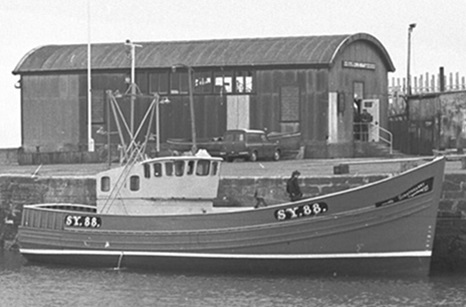
Classic fishing boat: Bonnie Lass III RY 189
The Gerrard brothers were David and Andrew, who along with their father, also Andrew, had set up their boatbuilding business alongside the lifeboat station in Arbroath in the early 1950s. Their first build was the Bairn’s Pride AH 27, launched in 1955. They built at least 72 vessels up to 1990, after which they had to rely on repairs and overhauls to sustain the business. It went into receivership in 1994, largely due to the decline in the fishing fleet in the town, meaning that even maintenance work had dried up. Strathgarry SY 88 was painted green and was renowned for having a steep deck, with the distinctive Gerrard’s bow. The Caterpillar 250hp engine was forward at launch, though was moved aft later. Photos, more, >>CLICK TO READ<< 08:12
Cuban-born net maker shares his journey from Havana to New Bedford’s working waterfront
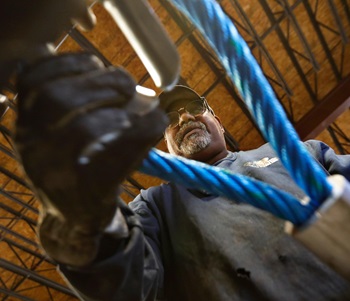 When he had his chance, Cuban-born net maker Miguel Sanchez escaped his home country, jumping from a Cuban fishing boat aboard a ship heading to Canada. The young law student escaped to start a new life, far away from Cuba and its oppressive dictatorship, the only member of his family to escape. Sanchez left Havana abruptly on March 24, 1996, before heading to Canada, arriving in Nova Scotia on April 15, 1996. A year ago, after spending more than 20 years in Nova Scotia, he got a call to work at Reidar’s Manufacturing on the New Bedford waterfront. His skills as a net maker were in demand. Sanchez worked in Nova Scotia for more than 20 years for different fishing companies under the country’s International Mobility Program, teaching and working with wire rope, when he got the call to work at Reidar’s Trawl Gear. more, >>CLICK TO READ<< 06:31
When he had his chance, Cuban-born net maker Miguel Sanchez escaped his home country, jumping from a Cuban fishing boat aboard a ship heading to Canada. The young law student escaped to start a new life, far away from Cuba and its oppressive dictatorship, the only member of his family to escape. Sanchez left Havana abruptly on March 24, 1996, before heading to Canada, arriving in Nova Scotia on April 15, 1996. A year ago, after spending more than 20 years in Nova Scotia, he got a call to work at Reidar’s Manufacturing on the New Bedford waterfront. His skills as a net maker were in demand. Sanchez worked in Nova Scotia for more than 20 years for different fishing companies under the country’s International Mobility Program, teaching and working with wire rope, when he got the call to work at Reidar’s Trawl Gear. more, >>CLICK TO READ<< 06:31
Canada’s largest lobster fishery set to begin amid threat of Trump tariffs
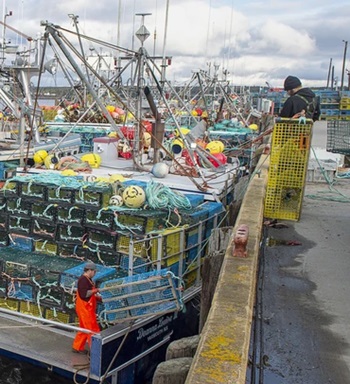 Trump’s inauguration is still a couple of months away, he officially takes office on Jan. 20, but fishermen are trying to take the threat in stride while preparing for the season to open Nov. 25. “People are concerned, but until it happens, we’ll just carry on,” Geoff Irvine, executive director of the Lobster Council of Canada, said. “There’s not a lot we can do to prepare and speculating on what it could mean doesn’t really get us anywhere.” As a result, the stakes are high if U.S. president-elect Donald Trump makes good on his campaign promise to impose duties of between 10 per cent and 20 per cent on all imported goods. While fishermen are worried about how this will play out, he said they have more immediate concerns on their minds. “What’s the catch going to be like?” he said. “What’s the price of lobster going to be like? What’s the weather going to be like? “more, >>CLICK TO READ<< 15:26
Trump’s inauguration is still a couple of months away, he officially takes office on Jan. 20, but fishermen are trying to take the threat in stride while preparing for the season to open Nov. 25. “People are concerned, but until it happens, we’ll just carry on,” Geoff Irvine, executive director of the Lobster Council of Canada, said. “There’s not a lot we can do to prepare and speculating on what it could mean doesn’t really get us anywhere.” As a result, the stakes are high if U.S. president-elect Donald Trump makes good on his campaign promise to impose duties of between 10 per cent and 20 per cent on all imported goods. While fishermen are worried about how this will play out, he said they have more immediate concerns on their minds. “What’s the catch going to be like?” he said. “What’s the price of lobster going to be like? What’s the weather going to be like? “more, >>CLICK TO READ<< 15:26
Why Canada’s decision to lift a ban on cod fishing in Newfoundland after 32 years is so controversial – Podcast
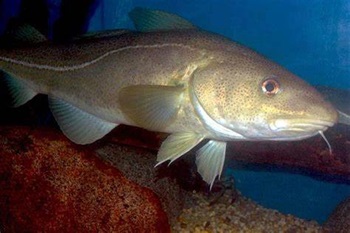 For generations, cod fishing was a way of life in Newfoundland and Labrador, the easternmost province in Canada. But in 1992, after cod stocks in the north Atlantic plummeted, the federal government imposed a moratorium on cod fishing. It was to last for 32 years until it was lifted in June 2024. Fishing has been the backbone of the economy for centuries, and so when the Canadian government imposed a cod moratorium in 1992 it had a huge impact, with an estimated 30,000 people in Newfoundland and Labrador out of work overnight. Some cod fishing was permitted in inshore waters from the late 1990s in boats less than 20 metres long, but all commercial offshore trawler fishing was prohibited. Links, more, >>CLICK TO READ<< 11:48
For generations, cod fishing was a way of life in Newfoundland and Labrador, the easternmost province in Canada. But in 1992, after cod stocks in the north Atlantic plummeted, the federal government imposed a moratorium on cod fishing. It was to last for 32 years until it was lifted in June 2024. Fishing has been the backbone of the economy for centuries, and so when the Canadian government imposed a cod moratorium in 1992 it had a huge impact, with an estimated 30,000 people in Newfoundland and Labrador out of work overnight. Some cod fishing was permitted in inshore waters from the late 1990s in boats less than 20 metres long, but all commercial offshore trawler fishing was prohibited. Links, more, >>CLICK TO READ<< 11:48
Call for fishermen to join farmers’ protest
 Great Yarmouth skipper Paul Lines and Lowestoft fishmarket boss and former MEP June Mummery are calling on the fishing industry to back a farmers’ protest at Westminster next Tuesday, 19 November. The protest has been called following the announcement in the recent budget that farmland would no longer be exempt from inheritance tax but has rapidly moved to encompass wider concerns about food security. Paul Lines will be wearing wet-weather gear, including his sou’wester, to highlight the concerns of the fishing industry, and is calling on other fishermen to join him, if possible, similarly dressed. more, >>CLICK TO READ<< 07:40
Great Yarmouth skipper Paul Lines and Lowestoft fishmarket boss and former MEP June Mummery are calling on the fishing industry to back a farmers’ protest at Westminster next Tuesday, 19 November. The protest has been called following the announcement in the recent budget that farmland would no longer be exempt from inheritance tax but has rapidly moved to encompass wider concerns about food security. Paul Lines will be wearing wet-weather gear, including his sou’wester, to highlight the concerns of the fishing industry, and is calling on other fishermen to join him, if possible, similarly dressed. more, >>CLICK TO READ<< 07:40
Save LBI Stays Course Despite Trump’s Promise to Kill Offshore Wind
 While President-elect Donald Trump is expected to make sweeping changes to the national energy policy, including doing away with offshore wind on Day 1 of his new term, a local grassroots organization isn’t letting that news get in its way of fighting the construction of what is poised to be the country’s largest wind farm some 9 miles off the coast of Long Beach Island. “We will be filing major lawsuits by the end of the month to invalidate at least some of those prior federal approvals,” Bob Stern, president and cofounder of Save LBI, said just days after voters returned Trump to office for a second term. “In addition, we will be seeking to have the lease area itself canceled so that new projects will not be resurrected in the future.” more, >>CLICK TO READ<< 15:05
While President-elect Donald Trump is expected to make sweeping changes to the national energy policy, including doing away with offshore wind on Day 1 of his new term, a local grassroots organization isn’t letting that news get in its way of fighting the construction of what is poised to be the country’s largest wind farm some 9 miles off the coast of Long Beach Island. “We will be filing major lawsuits by the end of the month to invalidate at least some of those prior federal approvals,” Bob Stern, president and cofounder of Save LBI, said just days after voters returned Trump to office for a second term. “In addition, we will be seeking to have the lease area itself canceled so that new projects will not be resurrected in the future.” more, >>CLICK TO READ<< 15:05






